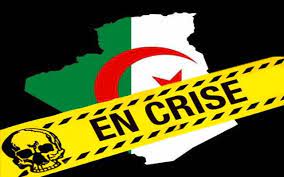
British weekly “The Economist”, one of the world’s reference publications, painted a gloomy picture of the “dismal” economic, political and social situation in Algeria, pointing out that the regime has been saved only by the onset of covid-19 in 2020, which caused the Hirak to fizzle out, and by the rocketing price of gas and oil that enables the state to subsidize staple foods, electricity, cooking oil, petrol and housing.
In the recently published article under the title “A rotten regime saved, for now, by gas”, The Economist pointed out that “…Algeria’s economy and politics are both sclerotic, its leadership repressive yet feeble, its role in Africa and the Arab world self-regarding but unappreciated.” This is how the article describes the situation in the country, whose people, “especially the young, are unhappy, frustrated and fearful of authority.”
The Weekly, pointing out that in this country “nobody really knows who’s in charge”, depicted the investment climate in Algeria where “the lethargy and incompetence of officialdom make business extraordinarily tricky” while ministers or senior officials are required to sign off on virtually any deal just to save the face of the military regime.
Besides, the laws passed in 2019 that were supposed to open investment to foreigners, have not convinced investors as most foreign business people remain flummoxed by the new laws and their small print. “Western banks and the IMF, regarded with suspicion in official Algerian circles, remain wary of entanglement. Bureaucratic obstacles, gross incompetence and a hostile attitude to foreign capital, especially French and American, still deter foreigners,” The Economist stated, listing the other constant complaints by investors.
On the social situation prevailing in Algeria, the magazine pointed out that two words in the local lexicon encapsulate Algeria’s malaise: hogra and haraga. “The first encompasses a range of gloomy feelings that affect Algerians: a sense of humiliation and oppression, a denial of dignity. This leads to the second increasingly common word, literally meaning “those who burn,” The Economist outlined, explaining that Haraga is applied to the growing number of Algerians wanting to emigrate illegally to get a better life abroad, involving the burning of identity papers. “So far this year some 13,000 have reached Spain in rickety boats,” it recalled.
The article which recalled the Hirak movement that toppled the late Abdelaziz bouteflika pointed out that it soon became clear that the new regime of Abdelmadjid Tebboune, was much the same as its predecessor and that it has been saved only by the onset of covid-19 in 2020, which caused the Hirak to fizzle out, and by the rocketing price of gas and oil that enable the state to subsidize staple foods, electricity, cooking oil, petrol and housing.
The article which analyzed the human rights situation in the country also criticized the official media as being “pathetically sycophantic” whereas the Western press is regarded as hostile and the opposition media and the Hirak as infiltrated by foreign powers.
Official pronouncements tend to be infused with a mixture of boastfulness and paranoia. Candid assessments are furiously dismissed as racist or driven by a hate-filled desire to destabilize the country.
The magazine noted in this connection a constant in Algerian official media, which are, it said, “also obsessively virulent towards neighboring Morocco, especially as the diplomatic tide may be turning against Algeria in its campaign to win independence for Western Sahara from Morocco’s occupation.”
